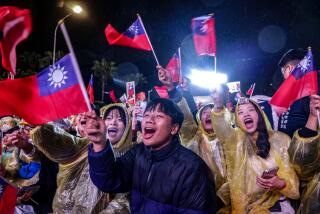Myanmar’s Suu Kyi says she’s aiming for the top
NEW DELHI -- Most politicians coyly deny they want to lead their country until the last possible minute, but Myanmar opposition leader and Nobel laureate Aung San Suu Kyi dispensed with the usual pleasantries Thursday and announced unequivocally her desire to be president two years before the 2015 election.
Although she’s expressed interest before, the timing and venue, a packed meeting of the World Economic Forum in Naypyidaw, Myanmar’s capital, was designed for impact.
“I want to run for president and I’m quite frank about it,” she told a panel. “If I pretended that I didn’t want to be president, I wouldn’t be honest and I would rather be honest with my people than otherwise.”
Only one problem: It will be all but impossible for her to run in the 2015 election. And she knows it.
When the then-military dictatorship decided a few years ago to introduce limited democratic reforms and open Myanmar, also known as Burma, to the West, analysts said, it wrote rules to ensure the popular Suu Kyi wouldn’t threaten its power.
“It’s almost impossible for her to be president,” said Tint Swe, a former member of parliament with Suu Kyi’s National League for Democracy party and chairman of Burma Center Delhi, a civic group. “The regime in power before 2008 did this intentionally, making it almost impossible to amend the constitution.”
Myanmar’s constitution states that no Burmese citizen with foreign relatives can become president or vice president. Suu Kyi’s now-deceased husband was British and her two sons hold British passports.
Beyond that are various procedural barriers. A constitutional amendment requires at least 75% parliamentary approval. But 25% of the body’s seats are reserved for the military, while a majority of those remaining are held by former soldiers or their close business associates.
“The constitution is designed so it really can’t be changed without the military deciding to do so,” said Bertil Lintner, a Thailand-based author of seven books on Myanmar. “And it’s an extremely cumbersome procedure. There’s simply no time.”
In her comments Thursday, Suu Kyi said sitting around hoping for reform wasn’t enough, it was time to act. “If you talk to the man on the street, if you talk to people in villages, the great majority of them would say that their lives have not changed since 2010,” she told the forum. People “want to feel that they have been included in the process of change,” she added.
Even if parliament approves an amendment allowing her to run, the change still requires majority approval in a nationwide referendum, requiring more time, analysts said.
Finally, there’s the issue of precedence. Once one amendment is proposed, a host of other groups would likely lobby for their own proposed changes involving media, labor rights, economic monopolies and freedom of assembly issues, which the military would resist, further slowing the process.
In any fair election based on a popular vote, many Burmese say, Suu Kyi would win handily over her military-backed rivals. She won her parliamentary seat with 99% of the vote in an April 2012 by-election, while her party took 43 of the 44 seats it contested.
“Definitely, most people in the country would vote for Aung San Suu Kyi,” said Bo Kyi, joint-secretary of the Thai-based Assistance Assn. for Political Prisoners (Burma), a civic group, adding that it’s difficult to know how she would do as president given that she’s untested.
Knowing the procedural impediments she faces, Suu Kyi may have made Thursday’s high-profile announcement before diplomats, foreign bankers, company heads and U.N. officials to embarrass and otherwise pressure the government as it hosted the international community, some said.
“She might just be trying to put some pressure on the government, to improve her bargaining position,” said Morten B. Pedersen, a senior lecturer with the Australian Defense Force Academy.
Another possibility, analysts said, is that she’s laying the groundwork for the 2020 election, even though she would be 74 by then and has recently appeared frail in public.
A military-backed government elected in 2015 has the option of giving her a ministerial portfolio, perhaps involving health or education. But authors of the constitution have anticipated this possibility as well with rules that require ministers to leave their political party.
“That would completely neutralize her,” Lintner said. “There’s no way they’re going to give her any power.”
Some applauded her for Thursday’s bid to enact change despite the long odds. “She’s given promises to the people to try and improve their lives,” said Tint Swe. “But to implement that, she must be the decision-maker at the top. The situation is changing, the domestic politics are changing and Aung San Suu Kyi is trying very hard.”
More to Read
Sign up for Essential California
The most important California stories and recommendations in your inbox every morning.
You may occasionally receive promotional content from the Los Angeles Times.










